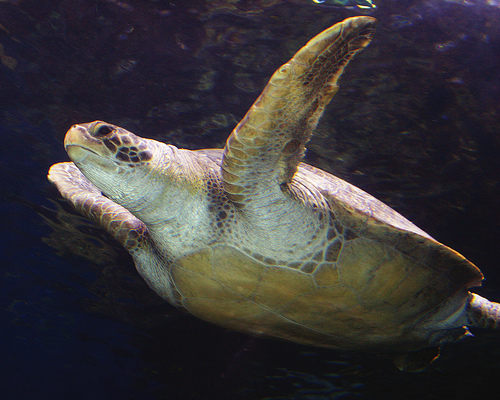
Ralphs
Discount tickets available at Ralphs for a limited time
Journey throughout the Aquarium to meet colorful coral reef animals as you learn about the importance of coral reefs and how to protect them.
July 1, 2020
Long Beach, CA—Take a voyage around the world to explore colorful coral reefs, the animals that call them home, and the threats they face along with solutions in a new exhibition, Coral Reefs: Nature’s Underwater Cities, opening at the Aquarium of the Pacific to members on Friday, June 12, and to the public on Sunday, June 14. Programming and exhibits will include a newly reimagined Tropical Pacific Gallery, new animals such as a green sea turtle and glowing corals, and more. The Aquarium invites you to take in the majesty of coral reefs as you learn about their importance and how to protect them through the new Coral Reefs: Nature’s Underwater Cities exhibition continuing until April 2021.
While coral reefs cover less than one percent of the ocean floor, more than 25 percent of all marine fish species depend upon them. Coral reefs are the world’s most diverse marine ecosystems, filled with colorful fish and invertebrates that are found nowhere else on Earth. Tens of millions of people rely on them for their livelihoods, and billions of people could potentially depend upon them for the life-saving, medicinal secrets they may contain. But these important ecosystems are at risk. Coral Reefs will examine this topic and what we can do to help.
To create the new exhibition, the Aquarium has redesigned its Tropical Pacific Gallery to focus on various aspects of coral reef habitats and showcase new animals. Some of the animals that will be highlighted include numerous species of coral, sea turtles, sharks, rays, and diverse and colorful reef fishes such as pufferfish, filefish, parrotfish, and flashlight fish. Learn how coral reefs form, how corals represent a mutually beneficial partnership between a colony-building ocean animal and algae, and discover the coral life cycle. Find out how so many animals live in close communities on coral reefs and how some species control the balance. Meet the new seabird animal ambassador, Sula the red-footed booby, and find out about her species’ relationship to coral reefs. Sula is one of two red-footed boobies known to be living at a zoo or aquarium. The global challenge of climate change is the main threat to coral reefs, but there is hope. “By ending overfishing and practicing sustainable coastal development in concert with other conservation efforts, we can buy time for coral reefs to rebound while we reduce emissions of greenhouse gases to slow and reverse the effects of climate change. Together, we can conserve coral reefs for generations to come,” said Dr. Sandy Trautwein, Aquarium of the Pacific vice president of animal husbandry.
Coral reefs are highly valuable to communities around the world. Besides serving as beautiful places to explore while snorkeling on a tropical vacation, coral reefs and the marine life they support serve many important uses for humans. Reefs help protect coastal communities by reducing the impact of storm surges. Healthy coral reefs support a diversity of marine life and are an important source of food for many nations, including the United States. They may also have uses that are yet to be discovered. Some corals and sponges contain compounds that may hold the cures for human diseases, yet 95 percent of the ocean, where these animals may be abundant, remains unexplored.
The new exhibition culminates with displays that show what people around the world are doing to help coral reefs and what each of us can do to join their efforts. The Aquarium of the Pacific has been involved in various programs to help coral reefs and promote coral conservation. Aquarium experts travel to places like Guam to assist with coral reef restoration as part of an ongoing effort with SECORE (Sexual Coral Reproduction) International, which the Aquarium joined in 2013. The Aquarium supported the CORALASSIST project in Palau in 2019 to help with efforts to sustain biodiversity and ecosystem services in the face of climate change. The Aquarium joined the board of Phoenix Islands Protected Area (PIPA) in 2017 to assist in ocean conservation. PIPA is owned and operated by the Republic of Kiribati and is the largest and deepest UNESCO World Heritage Site filled with coral reef ecosystems. The Aquarium also acts as a rescue facility for confiscated corals for the U.S. Fish and Wildlife Service and has a coral propagation area to grow and care for corals.
In addition to the new programming featured in Coral Reefs, the Aquarium has many other opportunities to see and explore this topic. In the Aquarium’s Ocean Science Center, visitors can learn about super corals that are able to survive ocean warming. Guests can also experience coral ecosystems found off Mexico in the Gulf of California exhibit. The Aquarium also offers a Tropical Reef Habitat live webcam. “We hope visitors leave in awe of the beauty and diversity of coral reefs with an understanding of their importance and feeling inspired to help protect them,” Dr. Trautwein said.
The nonprofit Aquarium of the Pacific is a community gathering place where diverse cultures and the arts are celebrated and where important challenges facing our planet are explored by scientists, policymakers, and stakeholders in search of sustainable solutions. The Aquarium is dedicated to conserving and building nature and nature’s services by building the interactions between and among peoples. Home to more than 12,000 animals, the Aquarium exhibitions include Pacific Visions, Molina Animal Care Center, and the Coral Reefs: Nature’s Underwater Cities exhibition. Beyond its animal exhibits, the Aquarium offers educational programs for people of all ages, including lectures by leading scientists. The Aquarium offers memberships with unlimited FREE admission for 12 months, VIP Entrance, and other special benefits. Convenient parking is available for $8 with Aquarium validation.

Discount tickets available at Ralphs for a limited time